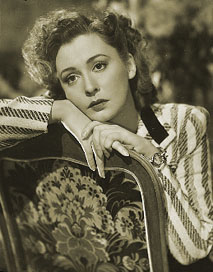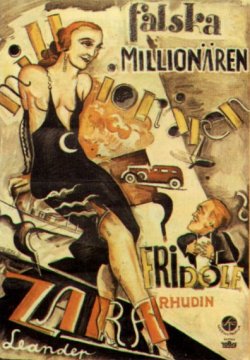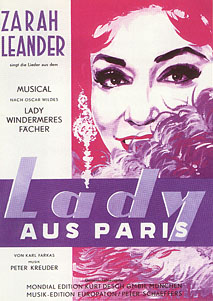In a brutalized time and place, one androgyne goddess dared to sing low when she sang love
 "Ich bin eine
Frau mit Vergangenheit - ich hab' viel
erlebt, und hat
nichts bereut!
" barks a voice like a gelded drill sergeant celebrating a
spanking. "I'm a
woman with a past; I've lived much, and regretted nothing!" It's a
tuneful orchestral
pop number from the little-remembered musical
Lady aus Paris,
but the eponymous Lady sounds like Scarpia after a fifth of whiskey and
two packs of Camels. Who is this intoxicating female whose mighty
throat sings of basso profundo nations?
"Ich bin eine
Frau mit Vergangenheit - ich hab' viel
erlebt, und hat
nichts bereut!
" barks a voice like a gelded drill sergeant celebrating a
spanking. "I'm a
woman with a past; I've lived much, and regretted nothing!" It's a
tuneful orchestral
pop number from the little-remembered musical
Lady aus Paris,
but the eponymous Lady sounds like Scarpia after a fifth of whiskey and
two packs of Camels. Who is this intoxicating female whose mighty
throat sings of basso profundo nations?
That he had no regrets, " Ich bereue nichts! " was the defiant autobiographical motto of Rudolf Hess. As Hess languished in Spandau prison in East Berlin, an aging star sang those same words, as a woman with a past, in Vienna in 1964. Whether it was telepathy or a fondness for her records, Rudolf Hess knew the lyrics that Zarah Leander enunciated with the overwrought rolled r's of a theatrical Swede, whose German was accented but whose camp was perfect. Born Zarah Stina Hedberg on March 15, 1907 in Karlstad to an organ maker, she grew up with a fascination for music and the stage and was accepted to acting school in Stockholm. Zarah married the Swedish actor Nils Leander in 1927 and toured provincial theaters with Ernst Rolf, the Swedish Ziegfeld, in 1929, exuding glamour and projecting a much-praised "contralto," which referred politely to her bass-baritone. In 1931, Zarah starred as Hanna in impresario Gosta Ekman's Stockholm production of The Merry Widow . Franz Lehar himself saw to transposing the role down two octaves.
When the union with Nils broke up in 1932 and she
married Vidar Forsell, son of celebrated Stockholm Royal Opera manager
and discoverer of Bj�rling John Forsell, the name had to stay; Zarah
Leander was famous. In 1936, Zarah broke into central Europe with a
resounding triumph in Ralph Benatzky's operetta
Axel an der Himmelst�r (Axel at Heaven's Gate), playing a parody of
a Garbo/Dietrich screen idol. Stung by the departures of the real
Dietrich and Garbo, the German film conglomerate Ufa signed the new
Swede success and undertook a vast advertising campaign to turn a fresh
hire into an instant icon. That face and that voice took the Reich by
storm with Zarah's second Ufa film, 1937's
Zu neuen Ufern
(To New Shores), directed by Detlef Sierck (later Hollywood's Douglas
Sirk.)
At the Berlin premiere at the baroque UFA-Palast am Zoo, Zarah took over seventy curtain calls. She was a superstar on the spot. Displaying fascism's usual weakness for grasping irony, the Nazi culture machine hired Zarah Leander while she was hamming it up as an ersatz diva and merchandised her as the real thing on movie screens across Europe. In 1936, Zarah was a singing comedienne in Vienna; within two movies and as many years, she was the great tragic lover of the German box office. A staff review in a 1938 issue of Filmwelt praised the newly minted goddess: "This incredibly impeccable and sculptured face mirrors everything that moves a woman: wistfulness and pain, love and bliss, melancholy and resignation. In her attitude as an actress, Zarah Leander is the epitome of 'spiritualized sensuality.' As dark as her low, undefinable alto - which is able to represent so excitingly the expression of hidden female desires - is also her essence." She got fan mail informing "Mr. Leander" that the writer owned all his records, and could he send an autograph. Callers on the telephone demanded repeatedly to speak to Frau Leander, insisting that a man must be at the other end.
 The war years were a bizarre romp across the cratered landscape of Nazi
propaganda production. Zarah's musical scores were insistently
'racially degenerate'; they overflowed with frowned-upon instruments,
like castanets, balalaikas, and stuffed trumpets, and dances such as
the habanera, tango, foxtrot and czardas, all from Afro-American and
Slavic origins. Out of line with notions of ideal German motherhood,
she was typecast as the questing, unlucky-in-love foreigner. (Goebbels
drew the ire of Alfred Rosenberg for letting her play a brassy, winning
English vaudevillian in
Zu neuen Ufern
.)
Exoticism was central; posters for
Cuba Cabana (1952), a postwar Zarah flop, boasted the arrival of
"The Great Exotic Film!" Goebbels came to appreciate Zarah for her box
office potency. Interpersonally and artistically, the distaste was
palpable from the start. "21 March 1937," begins the diary entry from
the pen of the lamed, hunched, stymied playwright and stentorian
propagandist who came to sexual maturity in his late twenties. "Chatted
[with Hitler] and watched a Swedish movie starring Zarah Leander. No
particular pleasure; I think the woman is very overrated. The movie
itself is typical of a small state's wares. I wish there were no
Swedes." Hitler was obsessed with Zarah's decolletage, though she
claimed she only met the Fuehrer once, in passing, at a restaurant;
others snickered at her "plowhorse behind."
The war years were a bizarre romp across the cratered landscape of Nazi
propaganda production. Zarah's musical scores were insistently
'racially degenerate'; they overflowed with frowned-upon instruments,
like castanets, balalaikas, and stuffed trumpets, and dances such as
the habanera, tango, foxtrot and czardas, all from Afro-American and
Slavic origins. Out of line with notions of ideal German motherhood,
she was typecast as the questing, unlucky-in-love foreigner. (Goebbels
drew the ire of Alfred Rosenberg for letting her play a brassy, winning
English vaudevillian in
Zu neuen Ufern
.)
Exoticism was central; posters for
Cuba Cabana (1952), a postwar Zarah flop, boasted the arrival of
"The Great Exotic Film!" Goebbels came to appreciate Zarah for her box
office potency. Interpersonally and artistically, the distaste was
palpable from the start. "21 March 1937," begins the diary entry from
the pen of the lamed, hunched, stymied playwright and stentorian
propagandist who came to sexual maturity in his late twenties. "Chatted
[with Hitler] and watched a Swedish movie starring Zarah Leander. No
particular pleasure; I think the woman is very overrated. The movie
itself is typical of a small state's wares. I wish there were no
Swedes." Hitler was obsessed with Zarah's decolletage, though she
claimed she only met the Fuehrer once, in passing, at a restaurant;
others snickered at her "plowhorse behind."
Zarah refused to be involved with politics, insisting that her job was to entertain, not take sides. The best that can be said of Schwarzkopf and Furtwaengler is that they played along; the worst that can be said of Zarah is that she played dumb. Zarah embodied Nazi glamour. She also traveled to Stockholm in 1938, already an established star, and recorded a jaunty rendition of Sholom Secunda's "Bei mir bist du schoen" only a few years before Charlie and his Orchestra started broadcasting an anti-Semitic Propagandajazz rendition into England, lampooning "the anthem of the international brotherhood of Bolsheviks." As the single best-paid star in wartime Germany, Zarah commanded half a million Reichsmarks for her last three-film deal.
 Enjoying the rare privilege of foreign-exchanging two-thirds of her
earnings, she invested the money in Sweden, in a house in the south and
a fish cannery. She declined German citizenship, refused an
estate in East Prussia, and shortly after production wrapped on
Damals (1943) and her Berlin home was leveled in air raids, fled to
Sweden. The Nazis saw her as a traitor and banned her films; the Swedes
gave her a collaborator's icy welcome. Only the Swedish Communist Party
embraced her, awarding her a certificate as "a true democrat."
Enjoying the rare privilege of foreign-exchanging two-thirds of her
earnings, she invested the money in Sweden, in a house in the south and
a fish cannery. She declined German citizenship, refused an
estate in East Prussia, and shortly after production wrapped on
Damals (1943) and her Berlin home was leveled in air raids, fled to
Sweden. The Nazis saw her as a traitor and banned her films; the Swedes
gave her a collaborator's icy welcome. Only the Swedish Communist Party
embraced her, awarding her a certificate as "a true democrat."
After the war, the Allies banned her from any appearances at all in Germany, associating her intimately with Nazi power. Denied her public for five years, she devoted herself to her fishery business. After having suppressed her as a Nazi, American military intelligence fingered her as a Soviet agent, citing the Communist certificate. There is something here; the Swedish daily Dagens Nyheter reported in 1999 that recently declassified documents from S�PO, the Swedish intelligence service, seem to corroborate the argument that Zarah Leander, self-described "political idiot" and immortal image of fascist glitter, was a Russian spy.
Though her postwar films never recaptured the old totalitarian magic, Zarah resumed a full career on the stage she loved, roaring back onto the scene at the Vienna Raimund-Theater with 1958's Madame Scandaleuse , which Peter Kreuder wrote for her, later touring with it to acclaim in Munich, Hamburg and Berlin. Her voice deepened and gained a guttural edge with age. Listening to a later Zarah song, like the testosterone-laden "Cabaret Paris," it is easy to think of Zarah trapped as a caricature. German critics think her as much, offering patronizing analyses of Zarah reduced to symptom and representation of Nazism.
From the coup with Axel on the Vienna stage in 1936, Zarah seems to have been locked in the cage of a stage farce of stardom rendered genuine. The inexplicable logic of fascism saw fit to make a passing joke into Zarah's half-decade of hegemonic spectacle. Zarah Leander was the most modern of divas: she played a diva in Axel , then was signed to a series of films playing divas, and those films' immense popularity reified divadom onscreen into divadom off-. As the years passed, the camp postures multiplied, the gestures grew more outsize, and the androgyny tilted ever manward, even as Zarah fretted about her waning beauty and the gravelly scratches in her voice.
|
Impenetrable scales, all the more fascinating, alas, as they were the more dangerous, covered the thighs of the Sirens, those daughters of the sea, whose voices are irresistible. D'Aurevilly, Dandyism |
Like no other artist, Zarah Leander was a protean product of her art and context. She was never out of date. Her first film, Dante's Mysteries , was 1930 Swedish expressionism barely of a piece with the sound era; her last film was a 1966 sex farce costarring Anita Ekberg. She recorded the Merry Widow Viljalied in 1931; she cut sides of John Lennon's "Yesterday" in 1973 and Kris Kristofferson's "Rien ne va plus" in 1977. There was no idiom that Zarah could not seize for her own, dominating it and being dominated in turn. Zarah, not unlike Ronald Reagan, but with more ideals, less senility, and a deeper voice, found her reality molded around the parts she played. She reflected only. Critic Georg Seesslen; unable to decode La Leander, despaired of her as "the falsest woman of the century."
 Zarah remains a cipher, if for nothing else than the sheer
improbability of her life. Imagine the late-era Judy Garland, with the
Carnegie Hall Latin orchestrations, taken down an octave, cannily
overacted, and commanding a rapt Nazi Europe through the empire of
sentiment: thus Zarah. As with Garland, gay audiences have loved, and
continue to love, Zarah. Transvestites imitate her adoringly. Nina
Hagen has cut tributes to Zarah, letting loose more vibrato than
perhaps anywhere else in her oeuvre, and went on to cut dance remixes
of those tributes. Zarah herself, writes an admiring Helma
Sanders-Brahms, projected "out of her breast and from much deeper, a
voice between man and woman
, a dream of snail-like bisexuality, self-engenderment that plummets
one to the abyss of one's own doubleness, in every man a piece of
woman, in every woman a piece of man." And from humble origins, this
many-gendered, great-hearted woman conquered the affections of
millions.
Zarah remains a cipher, if for nothing else than the sheer
improbability of her life. Imagine the late-era Judy Garland, with the
Carnegie Hall Latin orchestrations, taken down an octave, cannily
overacted, and commanding a rapt Nazi Europe through the empire of
sentiment: thus Zarah. As with Garland, gay audiences have loved, and
continue to love, Zarah. Transvestites imitate her adoringly. Nina
Hagen has cut tributes to Zarah, letting loose more vibrato than
perhaps anywhere else in her oeuvre, and went on to cut dance remixes
of those tributes. Zarah herself, writes an admiring Helma
Sanders-Brahms, projected "out of her breast and from much deeper, a
voice between man and woman
, a dream of snail-like bisexuality, self-engenderment that plummets
one to the abyss of one's own doubleness, in every man a piece of
woman, in every woman a piece of man." And from humble origins, this
many-gendered, great-hearted woman conquered the affections of
millions.
Zarah protected her favorite songwriter, Bruno Balz, when the Gestapo arrested him in 1942 for "immoral acts" with a lusty Hitler Youth, and Goebbels at last interceded to spare Balz as too valuable for morale to lose. This was not a difficult decision, given Balz's talents; among so many others, he wrote the lusciously memorable " Kann denn Liebe Suende sein? " ("Can love be a sin?") for Zarah. The real question is that of how, awakened by Zarah's call, a young Hitler Youth's eyes could not be opened to the suppleness of leather jackboots and the transcendent call of love, the more so when love was offered by the greatest songwriter in Germany. Wayne Koestenbaum writes that diva conduct "is a camp style of resistance and self-protection, a way of identifying with other queer people across invisibility and disgrace."
Die grosse Zarah , Zarah the Great, was just such resistance and self-protection, a voice in which sexual ambiguity, pride, strength and the maternal caress combined in a sphere of safety. Listening to Zarah sing, it was all right to be gay and to resist while the Swastika flew and the Gestapo roamed the streets.
 La Leander, though she may have traded in the lower realms of popular
song, belongs to the grand traditions of opera. She shared the screen
with Leo Slezak, as he spent his waning days as an Austrian film
comedian. She cribbed material from the arias of Gluck, Rossini, and
Verdi and the art songs of Tchaikovsky. A perennial late-Zarah favorite
is her reading of Cole Porter's "
Wunderbar
," which Cesare Siepi also covered. On balance, Siepi has a richer,
darker tone, though he hits some higher notes than she does. Siepi,
moreover, can never be a diva. His dime-store camp is only the happy
accident of a high-test bass doing Cole Porter of the Mantovani
"shimmering strings" school. There is nothing in Siepi to hold a candle
to Zarah's concluding phrasing, "It's, oy-yoy-yoy-yoy, it's wunderbar!"
before the live audience explodes into thunderous applause and
foot-stamping.
La Leander, though she may have traded in the lower realms of popular
song, belongs to the grand traditions of opera. She shared the screen
with Leo Slezak, as he spent his waning days as an Austrian film
comedian. She cribbed material from the arias of Gluck, Rossini, and
Verdi and the art songs of Tchaikovsky. A perennial late-Zarah favorite
is her reading of Cole Porter's "
Wunderbar
," which Cesare Siepi also covered. On balance, Siepi has a richer,
darker tone, though he hits some higher notes than she does. Siepi,
moreover, can never be a diva. His dime-store camp is only the happy
accident of a high-test bass doing Cole Porter of the Mantovani
"shimmering strings" school. There is nothing in Siepi to hold a candle
to Zarah's concluding phrasing, "It's, oy-yoy-yoy-yoy, it's wunderbar!"
before the live audience explodes into thunderous applause and
foot-stamping.
Popular culture, like Saturn, eats its children. How many theatergoers today remember Eleonora Duse or Alla Nazimova? In 1978, Rolling Stone magazine declared Barry Manilow "the artist of our generation"; within a decade, Barry Manilow was the punch line of the previous. Only opera, a willfully unpopular culture, claws at its stars in the present and reveres them in the past. Callas, Terrence McNally once recalled mournfully to this author, was savaged when she arrived in New York. To read the papers, she was an unseemly woman with an ugly voice. Zarah Leander also suffered to be misunderstood. For the respite she gave to her fans in an era of Grand Guignol come to life, for her privileging of androgyny and camp, and for the irreplaceable genius of her voice, she deserves her place in heaven, eyebrow-pencilled, rouged, and lipstick-drenched, at Callas' right hand. There, for posterity, may she be honored as diva and camp-mistress.
Ben Letzler was ejected from backstage at the Met once. His work has been rejected by the journal Commentary and accepted by The Rock , the journal of the Anglo-Catholic Church of Canada.
